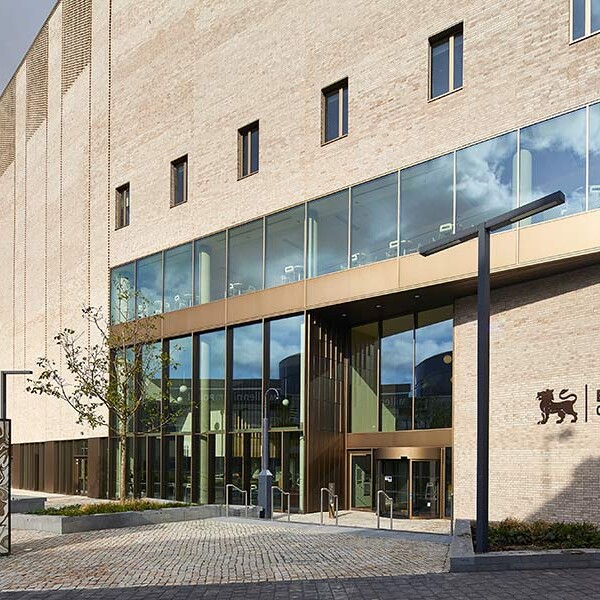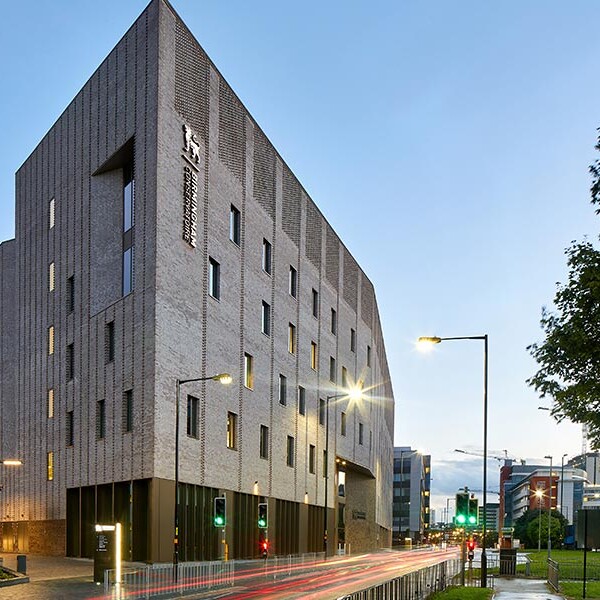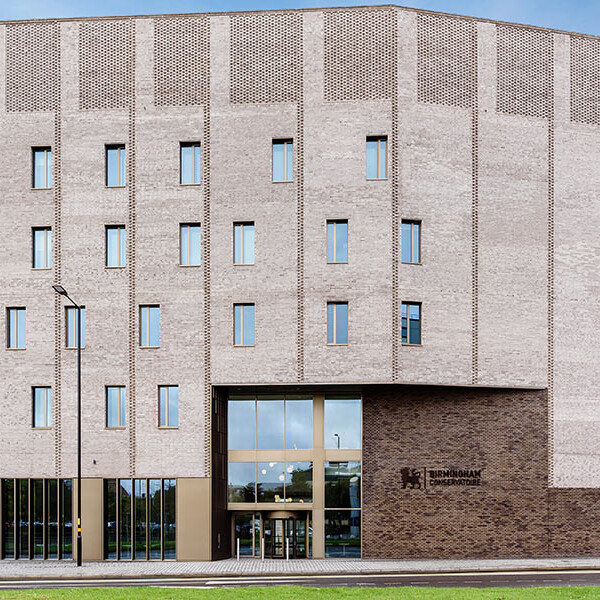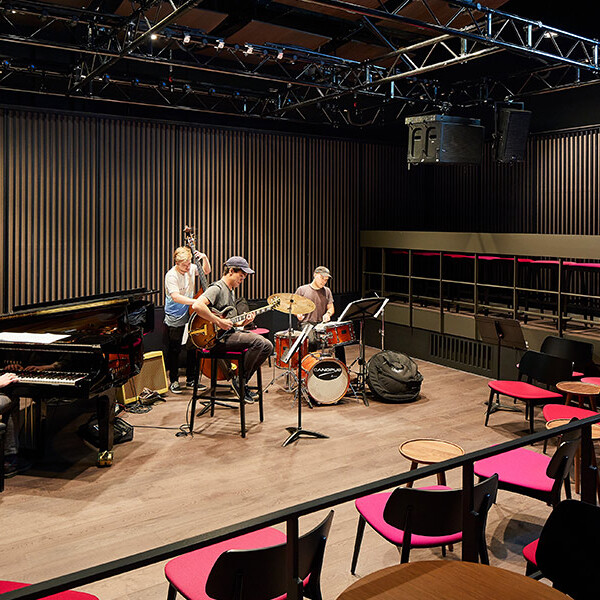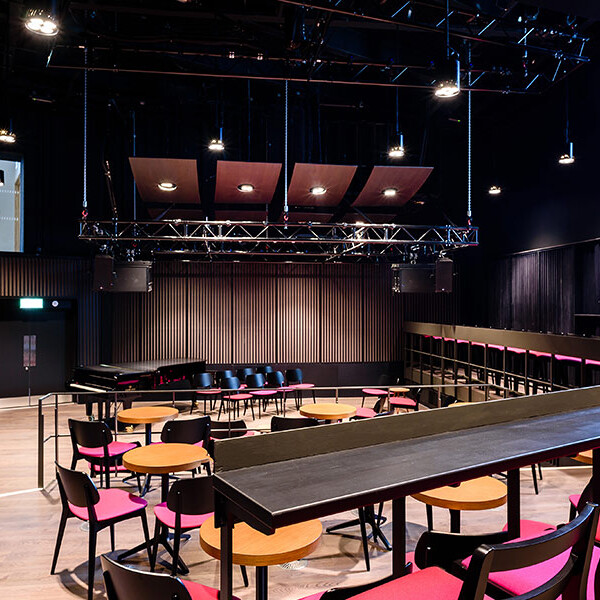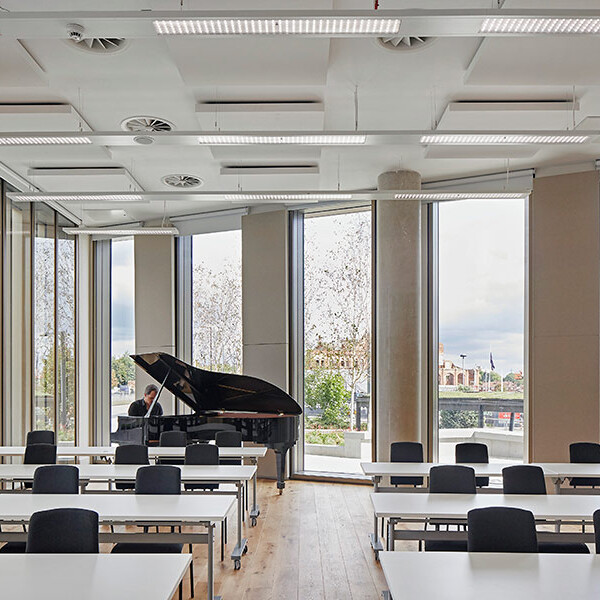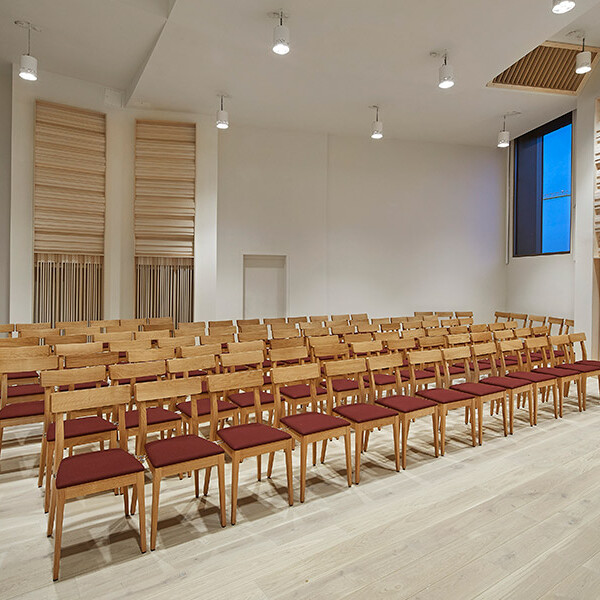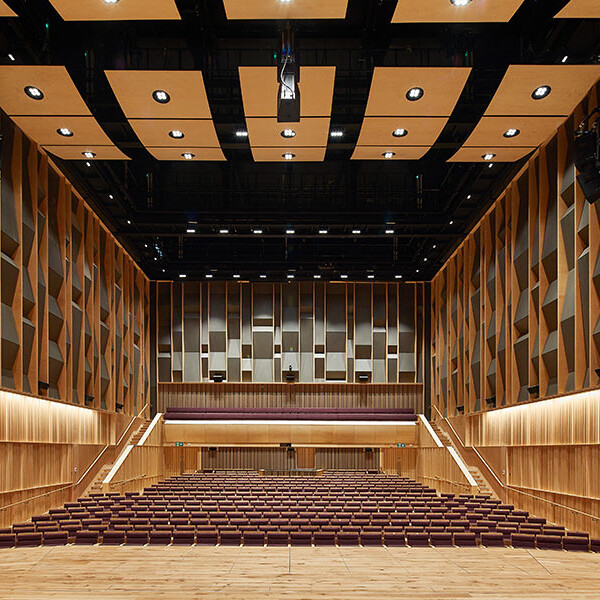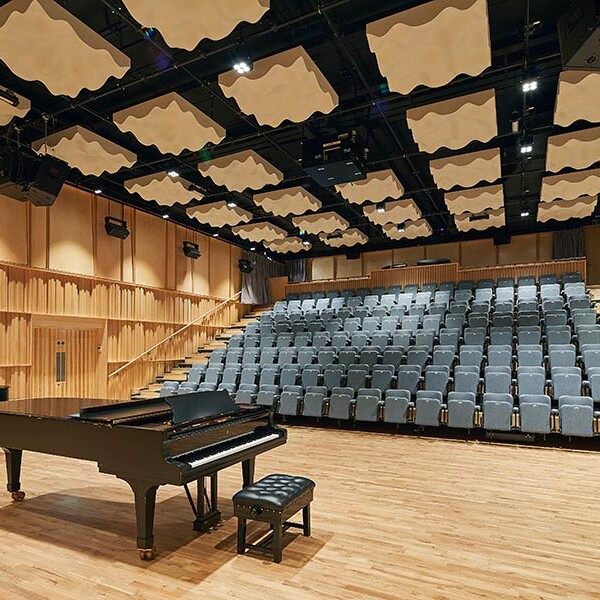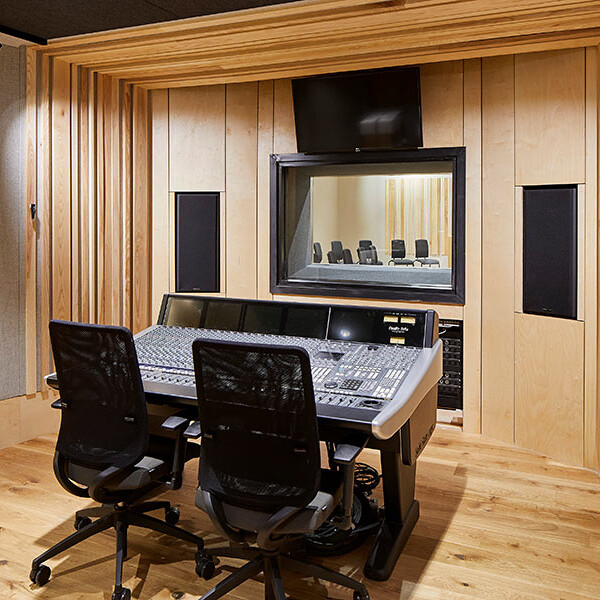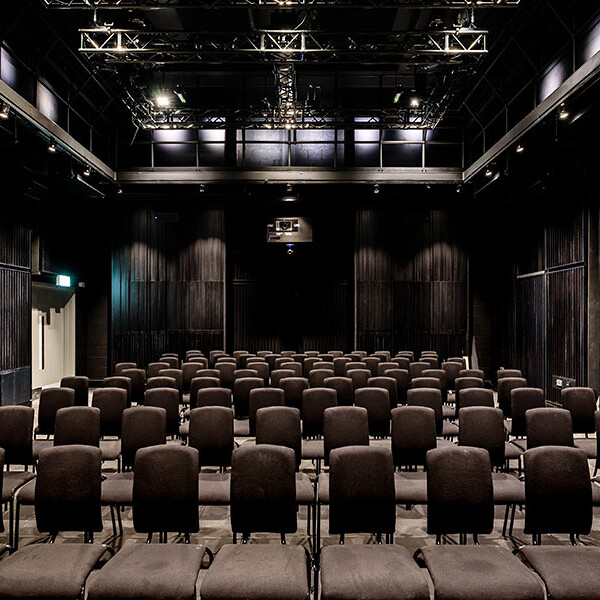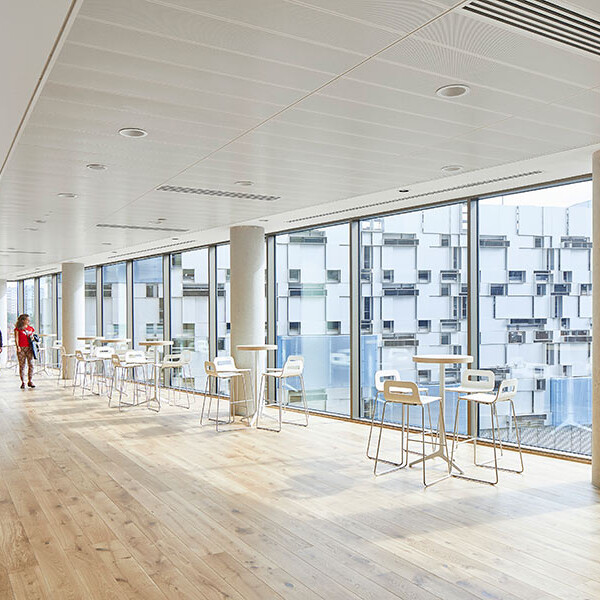
Music - BMus
Currently viewing course to start in 2025/26 Entry.
The BMus (Hons) degree at Royal Birmingham Conservatoire will help you to realise your potential and prepare you for a career in the music profession, whether that is in performance, composition, or music technology....
- Level Undergraduate
- Study mode Full Time
- Award BMus
- Start date September 2025
- Fees View course fees
- Subject
- Location Royal Birmingham Conservatoire
This course is:
Open to International Students
Overview
[00:00:01] Speaker 1 When you start your time here at RBC (Royal Birmingham Conservatoire), you'll be surrounded by people who have similar aspirations to you and or want to just make great music together. So this leads to really great friendships that will last a lifetime, but can also lead to the forming of chamber ensembles with your mates and networking opportunities that you can call upon all throughout your career. Being part of the arts, design and media faculty here at BCU gives you the chance to play on video game soundtracks, film soundtracks and even art exhibitions. I was lucky enough to get my first professional seat in an orchestra called The Chinese Orchestra at the end of my second year, and RBC managed to tailor my course to allow me to go around the world and perform as a professional trumpet player. As School rep for the Conservatoire, this has given me the opportunity to have meetings with senior staff and other students to discuss how we make the curriculum more inclusive and even how we program concerts to make sure it's as diverse as possible.
[00:01:04] Speaker 2 So I'm a music tech student. Wherever your interest lies, there is a specific room designed for that purpose. Whether that be recording, mixing, mastering or editing. We have several studios with incredible control rooms, with SSL mixing desks and live rooms with a variety of very nice mics. My confidence has risen to levels I didn't know I could reach. I think one of the greatest experiences of being a RBC has been the opportunity to join the Folk Ensemble. Once a week we meet up and we get the opportunity to tour across the UK. It's also a great place to meet people and feel integrated in the RBC community. Primarily, we play folk music, but we take influence from music all around the world and it's all fused with elements of rock, metal and jazz. The course is designed in a way that means that we get a lot of 1 to 1 time with professionals in the industry. The insights I've been given have been so amazing.
[00:02:08] Speaker 3 I have spent most of my final year looking at music education. I've focussed my major project on looking at strategies behind music education in schools and school projects, as well as delivering a music workshop in schools, in a care home and in hospitals. As the course has gone on, I've been given more chances to learn about how I best learn because of the independent study. The University facilities are right on the doorstep of the Conservatoire, and the Curzon Library is only a five minute walk away. The library is great for sheet music and it's also great for any research books we need for our projects. Every student has access to the support services at BCU and the mental health team have been a great support to me throughout my time at university. I've been president of BCUSU's LGBTQ+ Society for the last two years, where we work on improving the student experience for LGBTQ+ students and offering a safe space on campus. My time at university has helped me grow as a musician and as an individual. I'm excited to build my career using the skills that I've learned.
The BMus (Hons) degree at Royal Birmingham Conservatoire will help you to realise your potential and prepare you for a career in the music profession, whether that is in performance, composition, or music technology.
The programme will develop your specialist musical skills as well as developing your theoretical, historical, and practice-based knowledge, all the while encouraging your individual creativity. As a result, you will become an independent learner, a critical interpreter, and a reflective practitioner.
You will have the opportunity to study in one of three Principal Study areas:
- Performance (Instrumental or Vocal)
- Composition
- Music Technology
You will graduate with a named award that reflects the Principal Study area chosen.
During your time at the Conservatoire, you will study within a particular Department that is determined by your Principal Study area. Our departments are arranged by both instrument and specialism and include: Brass; Composition; Historical Performance; Keyboard; Music Technology; Percussion; Strings (bowed and plucked); Vocal and Operatic; and Woodwind.
With specialist tuition throughout all four years of the course, you will get the individual attention you need to prepare for a successful career. You will benefit from the care and attention of our highly qualified professional team of tutors and support staff, all of whom are dedicated to supporting and developing the potential of each student.
You will be based in our £57-million Conservatoire building, which features the 440-seat Bradshaw Concert Hall; the smaller Recital Hall; our black-box performance space known as The Lab; our dedicated Eastside Jazz Club; seven recording studios, editing and mastering suites; not to mention a large number of practice rooms, ensemble rooms and teaching workshops. All our spaces are acoustically designed to provide a world-class music-making environment.
Royal Birmingham Conservatoire is a friendly, welcoming, and highly supportive environment. We also benefit from being part of Birmingham City University’s Faculty of Arts, Design and Media, which provides many opportunities for collaboration and interdisciplinary projects.
What's covered in this course?
- In addition to benefiting from individual tuition in your specialist area, you will enjoy a range of activities designed to develop your artistry, musical fluency, and personal and professional awareness.
- You will find yourself immersed in regular masterclasses and performance or composition workshops. Individual ensemble coaching and playing and teaching techniques complete the picture, helping you to become a well-rounded musician.
- Top-flight singers and musicians – including baritone Roderick Williams, violinist Tasmin Little OBE, cellist Ben Davies, soprano Danielle de Niese, and pianist Stephen Hough – are among the many musicians who have worked with and inspired our students.
- In terms of Professional Development, you will also explore themes such as musicianship, history and performance practice, education, and outreach work, not to mention other topics such as health and wellbeing for performers, community music-making, conducting skills and other musical traditions.
- Towards the end of your course, you will embark on a final project that allows you to explore your personal musical aspirations. This can range from live performances to business projects; musicological dissertations to multi-media installations; educational events to professionally marketed recordings.
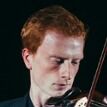
Studying at Royal Birmingham Conservatoire was a life changing experience for me, one which has shaped me as a musician and person. The BMus degree has given me the skill, knowledge and know-how to propel me into the beginning of my career as a musician. I chose to study at Royal Birmingham Conservatoire because the wealth of knowledge of the tutors was inspiring. Being part of the Conservatoire has allowed me to be involved with many differing projects and meet many different people from different walks of musical life.
Alistair Rutherford, BMus (Performance)
Why Choose Us?
- Top 15 in the UK for Music (Guardian League Table 2025).
- Our performance health programme — including performance coaching, physiotherapy, movement workshops and Alexander technique classes — allows students to develop as confident and effective performers.
- Individual specialist tuition throughout all four years of the course – far more than is typically offered by academic university music courses.
- We are recognised by the Association of European Conservatoires. All our tutors are professional musicians who bring a lifetime of musical experience and insight to their teaching.
- We have countless partnerships and long-established professional relationships with organisations including the City of Birmingham Symphony Orchestra, the Welsh National Opera, Birmingham Royal Ballet, Orchestra of the Swan and the Royal Shakespeare Company.
- You will have full access to our superb £57 million facilities. These include our wonderful performance spaces: the 500-seat Bradshaw Concert Hall, the 150-seat Recital Hall, our black-box performance space known as “The Lab”, the Organ Studio, and our fabulous Eastside Jazz Club. We’ve not even mentioned our seven recording studios and more than 70 practice rooms, ensemble rooms and workshops in addition; all acoustically designed to provide a music-making environment that is absolutely world-class.
Open Day
Join us on campus where you'll be able to explore our facilities and accommodation in person, and chat to staff and students from the Royal Birmingham Conservatoire.
Next Open Day: 12 June 2025
Entry Requirements
These entry requirements apply for entry in 2025/26.
All required qualifications/grades must have been achieved and evidenced at the earliest opportunity after accepting an offer to help confirm admission and allow for on-time enrolment. This can also include other requirements, like a fee status form and relevant documents. Applicants can track their application and outstanding information requests through their BCU mySRS account.
Essential requirements
32 UCAS Tariff points. Learn more about UCAS Tariff points.
Applicants will also need to complete an audition for this course; see audition arrangements below.
If you have a qualification that is not listed, please contact us.
Fees & How to Apply
UK students
Annual and modular tuition fees shown are applicable to the first year of study. The University reserves the right to increase fees for subsequent years of study in line with increases in inflation (capped at 5%) or to reflect changes in Government funding policies or changes agreed by Parliament. View fees for continuing students.
Award: BMus
Starting: Sep 2025
- Mode
- Duration
- Fees
- Full Time
- 4 years
- £9,535 in 2025/26 ✱ Important note for this price
- Apply via UCAS
(↩Back to price) * The Government is proposing to increase the cap on full-time regulated tuition fees to £9,535 for 2025/26 and the University is planning on increasing fees to that maximum level once legislation is enacted. Part-time fees are charged pro-rata, where applicable.
International students
Annual and modular tuition fees shown are applicable to the first year of study. The University reserves the right to increase fees for subsequent years of study in line with increases in inflation (capped at 5%) or to reflect changes in Government funding policies or changes agreed by Parliament. View fees for continuing students.
Award: BMus
Starting: Sep 2025
- Mode
- Duration
- Fees
- Full Time
- 4 years
- £27,500 in 2025/26
- Apply via UCAS
Applications are still open for September 2025. Apply now
Guidance for UK students
UK students applying for most undergraduate degree courses in the UK will need to apply through UCAS.
The Universities and Colleges Admissions Service (UCAS) is a UK organisation responsible for managing applications to university and college.
Applying through UCAS
- Register with UCAS
- Login to UCAS and complete your details
- Select your course and write a personal statement
- Get a reference
- Pay your application fee and submit your application
Personal statement
UK / EU students are required to submit a personal statement as part of their application for this course.*
The personal statement gives you a crucial opportunity to say why you’re applying and why the institution should accept you.
Here are the key areas you’ll need to address:
- Course choice - Why does this course appeal? What areas are of particular interest?
- Career plans - If you have a specific career in mind, say how your chosen course will help you pursue this goal.
- Work experience - Mention any work that is relevant to your subject, highlighting the skills and experience gained.
- School or college experience - Highlight skills gained at school/college, eg summer schools or mentoring activities.
- Non-accredited skills or achievement - eg Duke of Edinburgh Award, Young Enterprise scheme.
You should also mention your future plans – if you’re planning to take a year out, don't forget to give your reasons. Talk about any subjects you’re studying that don’t have a formal assessment and any sponsorships or placements you’ve applied for. And don't be scared to add in details about your social, sports or leisure interests.
Worried about Personal Statements?
If you've got no idea where to start or just want to check you're on the right track, we’ve got expert advice and real examples from our students to help you nail your personal statement. You can even download our ultimate personal statement guide for free.
*Non-EU students are not required to submit a personal statement when applying for this course.
Course in Depth
Year one
In order to complete this course you must successfully complete one of the following principal study modules and all the following CORE modules (totalling 120 credits):
This module lies at the heart of the course and of the learning experience for students on the performance pathway. It is the first of a suite of principal study modules undertaken in each of the first three years of the BMus (Hons) Performance, leading eventually to the Final Recital in year four. As such, it is therefore the first stage in realising course aims 1, 2 and 4 (Pursuing excellence; practice-led, knowledge applied; employability) in preparing musicians for the profession; nurturing their creativity as performers; and developing high standards of musicianship and technique.
This module lies at the heart of the course and of the learning experience for students on the performance pathway. It is the first of a suite of principal study modules undertaken in each of the first three years of the BMus (Hons) Performance, leading eventually to the Final Recital in year four. As such, it is therefore the first stage in realising course aims 1, 2 and 4 (Pursuing excellence; practice-led, knowledge applied; employability) in preparing musicians for the profession; nurturing their creativity as performers; and developing high standards of musicianship and technique.
This module lies at the heart of the course and of the learning experience for students on the performance pathway. It is the first of a suite of principal study modules undertaken in each of the first three years of the BMus (Hons) Composition, leading eventually to the Final Portfolio in year four. As such, it is therefore the first stage in realising course aims 1, 2 and 4 (Pursuing excellence; practice-led, knowledge applied; employability) in preparing musicians for the profession; nurturing their creativity as performers; and developing high standards of musicianship and technique.
This module lies at the heart of the course and of the learning experience for students on the performance pathway. It is the first of a suite of principal study modules undertaken in each of the first three years of the BMus (Hons) Music Technology, leading eventually to the Final Portfolio in year four. As such, it is therefore the first stage in realising course aims 1, 2 and 4 (Pursuing excellence; practice-led, knowledge applied; employability) in preparing musicians for the profession; nurturing their creativity as performers; and developing high standards of musicianship and technique.
Central to the course philosophy is the ideal of the informed musician: an intelligent listener who is able to understand, analyse and evaluate what is being heard. For context, this module begins with a study of ancient Western Art music, but rapidly moves to a focus on music which might best be described as stemming from the Age of Common Practice — that is from roughly 1650CE to 1900CE — the period in which tonality may be said to have triumphed.
A central principle behind the course philosophy is to create informed musicians who are able to make educated choices about their own practice. An awareness of different performance styles and traditions is therefore crucial not only to all performers, but also to composers, who can draw on this knowledge in their own compositions. The relationship between composer and performer in music dating from c. 1600-1900 is explored by considering the extent to which performers were expected to interpret written scores.
Within the modern profession, most musicians will spend a proportion of their time working in educational and community outreach contexts, presenting live music/composition workshops and/or interactive performances in settings away from the formal concert platform, in venues such as schools, hospitals, care homes, and rehabilitation centres. This module aims to give you a practical and theoretical introduction to the wide range of music activities taking place in community/education settings and therefore represents an aspect of preparing you for the profession as well as guiding you in your career aspirations by familiarising you with this important area of potential employment.
Year two
In order to complete this course you must successfully complete one of the following principal study modules and all the following CORE modules (totalling 120 credits):
This module lies at the heart of the course and of the learning experience for students on the performance pathway. It is the second of a suite of principal study modules undertaken in each of the first three years of the BMus (Hons) Performance, leading eventually to the Final Recital in year four.
This module lies at the heart of the course and of the learning experience for students on the performance pathway. It is the second of a suite of principal study modules undertaken in each of the first three years of the BMus (Hons) Performance, leading eventually to the Final Recital in year four.
This module lies at the heart of the course and of the learning experience for students on the performance pathway. It is the second of a suite of principal study modules undertaken in each of the first three years of the BMus (Hons) Composition, leading eventually to the Final Portfolio in year four.
This module lies at the heart of the course and of the learning experience for students on the performance pathway. It is the second of a suite of principal study modules undertaken in each of the first three years of the BMus (Hons) Music Technology, leading eventually to the Final Portfolio in year four.
Building on the core skills developed at Level 4, this module improves this understanding by following the same three complementary strands: historical awareness, aural perception and harmonic understanding. Students will continue to develop aural perception skills at a deeper level: pulse may become flexible, rhythm more complex, pitch and harmony more layered. Dynamics, style, texture, timbre and form also change dramatically and by including extended techniques and non-tonal approaches, the lexicon of music is widened enormously. Having established a secure grasp of the underlying principles of tonal harmony at level 4, they will now learn to apply such learning through the lens of stylistic awareness, investigating various genres such as the trio sonata, the string quartet, and voice and piano.
This module builds upon the principles and skills introduced in Performance Traditions 1. The philosophy of informed musicians (including performers, composers, and music technologists) who can make educated choices about their own practice is extended in this module to explore a wider range (than that covered in PT1) of performance issues relevant to both historical and contemporary musical idioms/ styles [course aim 1]. In keeping with the course philosophy, this module responds to the principle that the modern, informed performer must be aware of performance practices (both past and present) and be able to contextualise these in relation to relevant source materials and evidence (including scores/ notation, recordings, and other written or verbal forms of performance practice documentation).
The course’s primary aim, central to its philosophy, is to equip students for a career in the music profession. Many Conservatoire graduates will teach as part of their professional life, and in the second year of the course you will study the pedagogical aspects of your principal-study discipline as an important aspect of preparing you for the profession. This will equip you with additional skills which are likely to prove useful in your future musical career.
Year three
In order to complete this course you must successfully complete one of the following Principal Study modules and all the following CORE modules (totalling 100 credits):
This module lies at the heart of the course and of the learning experience for students on the performance pathway. It is the last of a suite of principal study modules undertaken in each of the first three years of the BMus (Hons) Performance, leading eventually to the Final Recital in the year four.
This module lies at the heart of the course and of the learning experience for students on the performance pathway. It is the last of a suite of principal study modules undertaken in each of the first three years of the BMus (Hons) Performance, leading eventually to the Final Recital in the year four.
This module lies at the heart of the course and of the learning experience for students on the performance pathway. It is the last of a suite of principal study modules undertaken in each of the first three years of the BMus (Hons) Composition, leading eventually to the Final Portfolio in the year four.
This module lies at the heart of the course and of the learning experience for students on the performance pathway. It is the last of a suite of principal study modules undertaken in each of the first three years of the BMus (Hons) Music Technology, leading eventually to the Final Portfolio in the year four.
In this module, students choose two specialist areas of study, one in each semester, the topics being offered reflecting the research enthusiasms of the staff, so engaging students with areas of learning led by the research and performance practice of their tutors. Central to the course philosophy is the ideal of the informed musician, one who is able to employ both advanced skills and knowledge in the advancement of their musical career. Performers and composers require a variety of specialist musicianship skills in order to support and enhance their professional development and employability as individual practitioners, and this module supports the course philosophy by enabling students to study specific areas of music in depth and detail.
In this module, students choose two specialist areas of study, the topics being offered reflecting the research enthusiasms of the staff, so engaging students with areas of learning led by the research of their tutors. Central to the course philosophy is the ideal of the informed musician, one who is able to employ both advanced skills and knowledge in the advancement of their musical career. Performers and composers require a deep understanding of music’s contexts in order to develop an informed understanding of their own relationship to specific performing and composing traditions and practices, and this module supports the course philosophy by enabling students to study specific areas of music in depth and detail.
In order to complete this course you must successfully complete a further 20 credits from the following indicative list of OPTIONAL modules.
The module is an opportunity to learn and critically reflect on the skills of collaboration by enabling you to create an interdisciplinary project with students from complementary disciplines, or with academic staff. Collaboration is a vital employability skill within the Creative Industries and this module allows you to develop these skills, making use of University facilities and with the support of academic staff. Within this module framework, several kinds of collaborative opportunities are available. For example, with the approval of your supervisor, you can determine a project based on your own interests; your supervisor may set you a predetermined project to enable you to work with other students in a way that is appropriate to your subject area; or there may be opportunities for you to collaborate with staff on research projects. In all cases, you must apply your subject skills to an interdisciplinary project which will be agreed in advance with your supervisor.
This module provides an opportunity for you to apply your knowledge and skills to an external, professional brief. The brief will be set by an external client/ agency, in consultation with your supervisor, and it could be a ‘real life’ problem to be solved, or a simulation. It is an opportunity for you to engage in a professional manner with an aspect of your subject area, which contributes to the development of employability skills within the supportive infrastructure of the University. Where appropriate, the project may involve interdisciplinary collaboration with students from other courses. In this way, it reflects the collaborative, flexible nature of employment within the Creative Industries.
The purpose of this module is to enable you to develop professional attributes and subject skills through experience in the work place, and to critically reflect upon your learning in that context. You will normally be expected to arrange your own placement, with support from academic staff and ADM Careers+.
Core modules are guaranteed to run. Optional modules will vary from year to year and the published list is indicative only.
Year four
In Year four, all students will select a total of 120 credits which must include one module from List A (Principal Study), one module from List B (Project) at least 20 and no more than 40 credits from list C (indicative list of optional modules).
- Final Recital (40 credits)
- Final Recital (60 credits)
- Final Composition Portfolio (40 credits)
- Final Composition Portfolio (60 credits)
- Final Music Technology Portfolio (40 credits)
- Final Music Technology Portfolio (60 credits)
- Final Project (20 credits)
- Final Project (40 credits)
- Final Project (60 credits)
- Further pedagogy (20 credits)
- Music, Community and Wellbeing (20 credits)
- Language of Music: Specialisms 2 (20 credits)
- Contextual Studies: Specialisms 2 (20 credits)
- Professional development (20 credits)
- Work Placement (20 credits)
Core modules are guaranteed to run. Optional modules will vary from year to year and the published list is indicative only.
Download course specification
Download nowCourse Structure
Years one to three
We concentrate on providing you with a thorough grounding in technical and performance/ composition skills, alongside contextual studies, musicianship and professional development activities such as conducting, pedagogy and community music. Each year, you have more choice and opportunities to specialise in your studies.
Professional development is embedded into our core modules, which focus on self-awareness, understanding your strengths and weakness, goal setting and self-motivation.
The Conservatoire participates in a number of exchange schemes with European and US Conservatoires. Provided that you achieve the appropriate levels of skills, you will be encouraged to spend a semester of year three at a partner institution.
Year 4
You will effectively design your own curriculum based on your career aspirations. You will be assessed on performance, composition or music technology (as appropriate) and design your own final project in any area of music you wish. You will take one or more additional modules in professional development, pedagogy or other specialist areas.
Student stories

Samantha Oxborough
Lancashire born twenty-five year old Mezzo Soprano Samantha Oxborough is a recent graduate from Royal Birmingham Conservatoire with a Post-Graduate Certificate and a Bachelor of Music with First Class Honours under Christine Cairns and David Wilkinson. In 2019, Samantha moved to London and joined the Young Artist Programme at the National Opera Studio.
Employability
Enhance Employability Skills
All of the UK's Conservatoires aim to do the same thing: to train students for the music profession with the emphasis firmly on your principal study, whether that is in performance, composition or music technology.
As a vocational programme, it is easy to see how all your principal-study work adds to your professional development. Yet Royal Birmingham Conservatoire believes other areas of the course are just as important: the skills in writing, research, communication and critical and reflective thinking that you develop in the academic modules are exactly the types of graduate skills that make you more employable in any area of professional life, musical or otherwise.
Team working and collaborative skills are highly valued in the profession as a whole and are particularly important in any musical context, and you will have opportunities to work as part of team and ensembles across all areas of the course. Equally, you will have opportunities to develop your ability to work under your own direction, whether that is through the individual time spent practising, researching and writing essays and presentations, or working on personal development projects.
The course is designed so that we can guide you through these developments in the early years, give you the ability to reflect on what you have already learned and, most importantly, what you still need to learn. Taking charge of your own development as a musician enables you to work more independently in the later years and provides an employability skill set vital to your continuing professional life.
Placements
There are variety of extracurricular schemes that take students out of the Conservatoire and into the professional world. Numerous professional engagements for students are administered through the Conservatoire’s Book a Musician service, which provides direct experience of paid professional work.
We also run a number of placement schemes. These include long-running schemes with the City of Birmingham Symphony Orchestra (CBSO), the Orchestra of the Swan, and the Welsh National Opera where students participate actively or as observers; a collaboration with Birmingham Contemporary Music Group (BCMG) which gives composition students the opportunity to have their music played by experienced professionals who also give feedback; and many other partnerships with organisations including:
- BBC Radio 3
- Welsh National Opera
- Arco Project
- Leamington Festival
- THSH
- Birmingham Cathedral
- St Chads
- Birmingham Opera Company
- Birmingham Philharmonic Orchestra
- Dudley Arts
- Heartlands Hospital
- Birmingham Music Service
- Birmingham Royal Ballet
- Jazzlines
- Town Hall Symphony Hall
and for pedagogy/education specific projects:
- Music in Hospitals and Care
- Air Arts, Derby Royal Hospital
- Birmingham Children's Hospital
- Elmhurst Ballet School
- Services for Education Music Service
- Sandwell Music Service
- Warwick School
- Calthorpe Academy
- In Harmony


